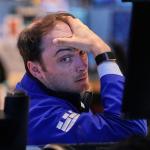The World Bank’s recent forecast paints a somber picture for the global economy, predicting that 2023 might witness the worst economic slowdown since the 2008 financial crisis. This alarming assessment stems from a range of factors, chiefly among them the escalating trade tensions largely ignited by U.S. tariffs under President Trump’s administration.
The financial institution, which plays a pivotal role in global finance, projects a notable decrease in global growth, with figures expected to dip to just 2.3 percent this year. This downturn is a result of restrictive measures not just in the United States but ripple effects impacting economies across approximately two-thirds of the world. The ramifications of these tariffs extend well beyond American borders, with significant repercussions for industries and trade partners globally.
For British firms with aspirations to expand to foreign markets, the revised growth forecasts introduce an air of uncertainty. The forecasts suggest that weakened demand for goods could hamper export flows, ultimately affecting businesses aiming to establish or expand overseas operations.
In light of the World Bank’s findings, the American economic outlook appears to be deteriorating sharply. Growth predictions have been revised down to just 1.4 percent, a stark contrast to an earlier forecast of a 2.3 percent increase. This decline reflects a broader trend, with growth anticipated to slow in around 60 percent of developing economies, resulting in a collective slowdown in global GDP.
A closer look at regional conditions reveals that the euro area is expected to see a modest growth of only 0.7 percent. This figure falls short of the typical growth patterns observed in recent years, which hovered around one percent. Countries like India and Saudi Arabia, which the UK is particularly interested in for increasing trade, are also likely to experience adverse effects from these economic trends.
Furthermore, the World Bank’s analysis indicates that global per capita growth is likely to land one full percentage point below the average seen from 2000 to 2019. This considerable drop highlights the challenges facing countries attempting to sustain or enhance living standards for their citizens amid such turbulent economic conditions.
To counteract this impending downturn, World Bank researchers recommend a multifaceted approach. They stress that countries should focus on “liberalising more broadly” by forging robust trade and investment deals, particularly with neighboring nations. This strategy could help stimulate growth and foster economic relationships vital to mitigating slump effects. Additionally, they advocate for governments to refine approaches to taxation and spending, which could serve to better strengthen economies during this difficult period.
The cornerstone of the World Bank’s analysis lies in the unpredictable landscape of U.S.-China trade relations. The current state of affairs hinges significantly on President Trump’s fluctuating policies regarding tariffs and trade agreements. Positive shifts in U.S. trading relations with China could provide a lifeline, potentially enabling global growth to rebound from an anticipated slump.
Negotiations between the U.S. and China have been ongoing, with officials from both nations engaged in discussions in London. U.S. Commerce Secretary Howard Lutnick reported that talks were “going well,” fostering some hope for a resolution. An agreement recently reached in Geneva saw U.S. tariffs on China drop to 30 percent, while reciprocal tariffs decreased to 10 percent. These developments illustrate the potential for diplomacy to alter the economic forecast positively.
However, despite these discussions, both countries grapple with significant bilateral tensions. Accusations of each violating commitments regarding rare earth materials have marred negotiations, further complicating the trade dialogue. Additionally, concerns regarding the safety and treatment of foreign students in the U.S. have emerged, adding another layer of complexity to diplomatic relations.
As global economic stability hangs in the balance, the findings from the World Bank underscore the importance of proactive measures from governments and institutions alike. Engaging in open dialogue, fostering trade relationships, and pursuing effective fiscal strategies could be vital in steering economies towards recovery.
In summary, the World Bank’s warning about the worst global economic slowdown since the 2008 crisis should serve as a clarion call for nations to prioritize economic collaboration, innovation, and resilience in their policies. It’s more crucial than ever for countries to adapt and respond to the changing economic landscape to safeguard their growth potentials and futures.
In the coming months, the world will be closely watching how these various factors interact—will the trade negotiations lead to a meaningful thaw in relations, or will tariffs continue to stifle growth? As we navigate these uncertain waters, the hope remains that cooperative efforts will lead to a more prosperous and stable global economy.
Source link










